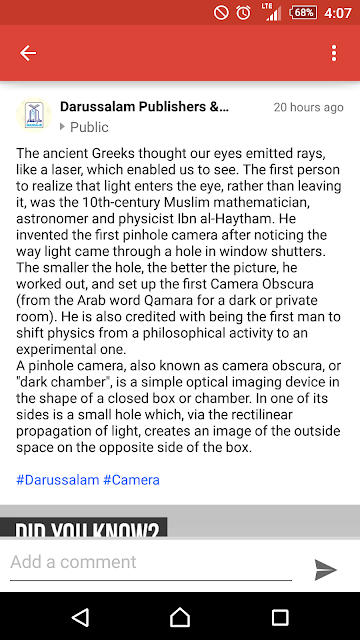5:06:44 AM
أبو ريان جفري
أريد أن أترجم هذه صفحة
أظن الكتاب من مدرسة البصريين. فعلموا الترجمة ليست قولي أو أنا مع القول. فإني مترجمة فقط
I think this book is from the Bashrah school. Be known that I'm just the translator nor that this is my opinion or I'm agree to it
أتمن الترجمة مفية لي ولكم
I hope this will benefited me and you guys
وَاللَّهِ رَبِّنَا مَا كُنَّا مُشْرِكِينَ
By Allah our lord we we not musrikeen
السلام عليكم
هذه الترجمة صعب لي. لا مشاركة حتى تأكداً للإخوان العلماء
This translation is hard for me. Don't share this untill it has been check by the brothers who really know this stuff
هذه الترجمة صعب لي. لا مشاركة حتى تأكداً للإخوان العلماء
This translation is hard for me. Don't share this untill it has been check by the brothers who really know this stuff
أريد أن أترجم هذه صفحة
I want to translate this page
أظن الكتاب من مدرسة البصريين. فعلموا الترجمة ليست قولي أو أنا مع القول. فإني مترجمة فقط
I think this book is from the Bashrah school. Be known that I'm just the translator nor that this is my opinion or I'm agree to it
أتمن الترجمة مفية لي ولكم
I hope this will benefited me and you guys
لو سمحتم صححوا أخطئي أينما وجدتموها
Please correct my mistakes where ever you find them
يسرنا الله أمرا
Please correct my mistakes where ever you find them
يسرنا الله أمرا
May Allah ease on our affair
*******
حرف الواو .
The letter waw
حرف يكون عاملا وغير عامل . فالعامل قسمان : جار وناصب .
It could be an agent ( which could change a word irab) or not an agent. For the agent is divided into two: Agent of Jar and Agent of Nasab
The letter waw
حرف يكون عاملا وغير عامل . فالعامل قسمان : جار وناصب .
It could be an agent ( which could change a word irab) or not an agent. For the agent is divided into two: Agent of Jar and Agent of Nasab
فالجار واو القسم ، نحو : والله ربنا ما كنا مشركين (الأنعام : 23 ) .
The "Jar" Waw of Oath
The "Jar" Waw of Oath
وَاللَّهِ رَبِّنَا مَا كُنَّا مُشْرِكِينَ
By Allah our lord we we not musrikeen
وواو " رب " على قول كوفي ، والصحيح أن الجر بـ " رب " المحذوفة لا بالواو
And the Waw of rubba in the opinion of Kufic Scholars. Actually it is the hidden Ba which make a word Jar not the waw
والناصب ثنتان : واو " مع " فتنصب المفعول معه عند قوم ، والصحيح أنه منصوب بما قبل الواو من فعل أو شبهه بواسطة الواو .
For the Agent of Nasab is 2: Waw "maa" that make nasab of the object with it when it has been fixed. Actually it is mansub with what is before Waw from a verb of something like it in the way of Waw
والواو التي ينتصب المضارع بعدها في موضعين : في الأجوبة الثمانية ، وأن يعطف بها الفعل على المصدر ، على قول كوفي . والصحيح أن الواو فيه عاطفة ، والفعل منصوب بأن مضمرة .
And the Waw that make Nasab the present tense verb after it at 2 places: At the eight answer. Accroding to the Kufic scholar , the waw which connected the verb to it source. Actually in the Waw there is connector. The verb is mansub because of implied
ولها قسم آخر عند الكوفيين ، تسمى واو الصرف ، ومعناها أن الفعل كان يقتضي إعرابا فصرفته الواو عنه إلى النصب ، كقوله تعالى : أتجعل فيها من يفسد فيها ويسفك الدماء ( البقرة : 30 ) على قراءة النصب .
The last division of Waw is accroding to the Kufic scholars. It is name Waw-of-Sorf. The meaning of it is that the verb call for the irab and the waw change it into nasb. Like the verse of 30 in Surah Al-Baqarah

